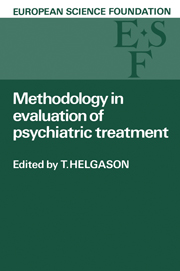 Methodology in Evaluation of Psychiatric Treatment
Methodology in Evaluation of Psychiatric Treatment Book contents
- Frontmatter
- Contents
- Participants
- Foreword
- Preface
- INTRODUCTION
- I METHODS OF CLASSIFICATION
- Principles of ‘Multiaxial’ Classification in Psychiatry as a Basis of Modern Methodology
- Standardized Methods of Classification of Mental Disorders
- The Significance of Biological Factors in the Diagnosis of Depressions
- II EVALUATION CRITERIA
- III RATING METHODS IN EVALUATION OF TREATMENT
- IV OTHER QUANTITATIVE METHODS OFEVALUATION OF TREATMENT
- V ETHICALAND PRACTICAL PROBLEMS
- Index
Standardized Methods of Classification of Mental Disorders
from I - METHODS OF CLASSIFICATION
- Frontmatter
- Contents
- Participants
- Foreword
- Preface
- INTRODUCTION
- I METHODS OF CLASSIFICATION
- Principles of ‘Multiaxial’ Classification in Psychiatry as a Basis of Modern Methodology
- Standardized Methods of Classification of Mental Disorders
- The Significance of Biological Factors in the Diagnosis of Depressions
- II EVALUATION CRITERIA
- III RATING METHODS IN EVALUATION OF TREATMENT
- IV OTHER QUANTITATIVE METHODS OFEVALUATION OF TREATMENT
- V ETHICALAND PRACTICAL PROBLEMS
- Index
Summary
Introduction
This paper is chiefly concerned with the advantages of introducing a degree of standardization into the processes of psychiatric diagnosis. The term ‘diagnosis’ refers both to a particular category within a nosological system and to the means whereby a decision is reached that a particular category is the one most appropriate for describing the patient's condition. I shall be concerned mainly with the second of these usages, i.e, with methods of standardizing the processes whereby a clinician collects information from and about patients and then classifies it, using the categories of some established system such as the International Classification of Diseases (WHO, 1978). However, any attempt at operationalization reveals hitherto unsuspected gaps where new categories may be needed, overlaps between categories previously thought to be discrete and, above all, a lack of clarity and precision in the definitions used by clinicians in daily practice. Constructing an operational system that simulates the processes of diagnosis, whatever the nosological classification, therefore requires its designers to use their own clinical judgement whenever there is any doubt. From a clinical point of view, the ‘standard’ system will have many of the characteristics, both good and bad, of the clinical system it is simulating. There is no way out of this; all that can be claimed is that the designers’ judgements are made within the spirit of a given school, and that they are specific, public and amenable to test by others. This claim, however, is a large and important one and lies at the heart of all scientific enquiry.
There is no possibility at the moment of standardizing all the elements in any diagnostic system, nOJ even of altogether standardizing anyone of them. There will always be unforeseen contingencies, complex modifying circumstances, and large gaps in knowledge, particularly in the absence of highly discriminating laboratory tests. In the face of uncertainty, the clinician's judgement, fallible though it is, must be paramount. The techniques I shall discuss are of great value to research workers, but any tendency to use them as substitutes for clinical practice (except through their increasing role in education) is greatly to be deplored.
- Type
- Chapter
- Information
- Methodology in Evaluation of Psychiatric TreatmentProceedings of a Workshop Held in Vienna 10–13 June 1981, pp. 81 - 92Publisher: Cambridge University PressPrint publication year: 1983


